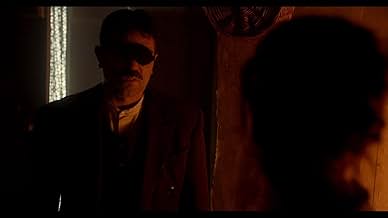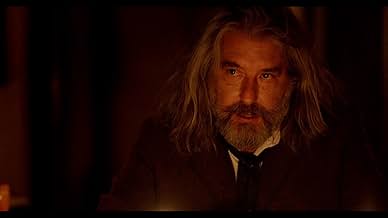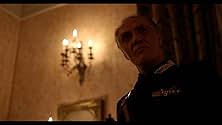PUNTUACIÓN EN IMDb
4,4/10
1,7 mil
TU PUNTUACIÓN
Sigue al santo católico Padre Pío en sus primeros años.Sigue al santo católico Padre Pío en sus primeros años.Sigue al santo católico Padre Pío en sus primeros años.
- Dirección
- Guión
- Reparto principal
- Premios
- 1 premio y 1 nominación en total
Reseñas destacadas
I was not expecting much reverence for the subject matter in a film by Abel Ferrara, whose latest film was about the Vatican blowing up. Ferrara seems to be his own audience these days.
Nevertheless, Shia Labeouf's publicized conversion to Catholicism did spark some interest (though I thought he already did this for "Fury"). However, my nose was still very well plugged, and it remained so. This is not a biography. It is just empty, with no real direction in story, nor any perceivable goal. The shark in "Jaws" was better utilized than Saint Pio was in this film; at least the shark was central to the plot, and his presence was felt- even when he was offscreen.
Ferrara's other films are brutal, unrelenting, dark and negative, and yet utilize Catholic imagery as little more than window dressing. Such is the case with this film, only its also part of the title. Don't waste your time. Watch "Padre Pio: Miracle Man" or "Padre Pio: Between Heaven and Earth," instead.
Nevertheless, Shia Labeouf's publicized conversion to Catholicism did spark some interest (though I thought he already did this for "Fury"). However, my nose was still very well plugged, and it remained so. This is not a biography. It is just empty, with no real direction in story, nor any perceivable goal. The shark in "Jaws" was better utilized than Saint Pio was in this film; at least the shark was central to the plot, and his presence was felt- even when he was offscreen.
Ferrara's other films are brutal, unrelenting, dark and negative, and yet utilize Catholic imagery as little more than window dressing. Such is the case with this film, only its also part of the title. Don't waste your time. Watch "Padre Pio: Miracle Man" or "Padre Pio: Between Heaven and Earth," instead.
Despite the historical events and perhaps leading characters personal dark and heavy route towards becoming who he was that does not mean they film needs to also be so dark.
It seems that lately films are more and more separated into fluff and pop corn blockbusters and then you have these heavy "artistic" or religious or quasi intellectual films where they examine certain characters or events. So that after the viewers and producers can pat each other on the back how smart and deep their introspection is.
While not too long ago, directors knew how to interweave complex, dark or troublesome events with light, with entertainment , with charismatic characters to offput that or moments to balance it out. Intellectual and dark doesnt mean it needs to be heavy and difficult to watch.
Very very few know how to do this nowadays, Lebeoufs films never do. They are just plain dark and uncomfortable to watch. Especially ones like this, where they (unfortunately only) focus on the most heavy part of his journey to becoming Padre Pio everyone knows.
It seems that lately films are more and more separated into fluff and pop corn blockbusters and then you have these heavy "artistic" or religious or quasi intellectual films where they examine certain characters or events. So that after the viewers and producers can pat each other on the back how smart and deep their introspection is.
While not too long ago, directors knew how to interweave complex, dark or troublesome events with light, with entertainment , with charismatic characters to offput that or moments to balance it out. Intellectual and dark doesnt mean it needs to be heavy and difficult to watch.
Very very few know how to do this nowadays, Lebeoufs films never do. They are just plain dark and uncomfortable to watch. Especially ones like this, where they (unfortunately only) focus on the most heavy part of his journey to becoming Padre Pio everyone knows.
Padre Pio is portrayed as being in a constant state of suffering. The last scene shows the stigmata and the entire movie seems to be leading up to that point. The film's purpose seems to be that the stigmata was real. Knowledge of Padre Pio is required before this movie will make any sense. Keep your finger on the volume dial for the whole movie. The sound is either so quiet that you have to turn it up to 70% and then there are points where it is so loud you have to turn it down to 20%. Most of the plot is boring and the nudity is unnecessary and precludes showing this film to a lot of people. In the movie, Padre Pio is disconnected from other people and I gather this movie will also not connect with many people either. Rent this film but do not buy it. It is an unpleasant, uninspiring movie. It does not draw people to faith.
The town parts, which is most of the movie, were just awful. Broken English, heavy accented English from everyone. Why not have them speaking Italian? It would have made it a lot better
But maybe only one star better. The town dialogue was boring and uninteresting and far from the way a regular person would speak. I did not care about any of the townspeople, they all could have died and I would have been happy to get back to the scenes of Pio which is the movie's topic.
I gave a star for Shia's performance as Padre Pio. Again the writing isn't there for it to be one of his best performances or anything, but it was the only enjoyable part of the movie.
I have a crazy idea why not put more Padre Pio scenes in a film about Padre Pio? Maybe they didn't think of that. Whole film could have been in the church instead and it would have been a solid 5/10.
But maybe only one star better. The town dialogue was boring and uninteresting and far from the way a regular person would speak. I did not care about any of the townspeople, they all could have died and I would have been happy to get back to the scenes of Pio which is the movie's topic.
I gave a star for Shia's performance as Padre Pio. Again the writing isn't there for it to be one of his best performances or anything, but it was the only enjoyable part of the movie.
I have a crazy idea why not put more Padre Pio scenes in a film about Padre Pio? Maybe they didn't think of that. Whole film could have been in the church instead and it would have been a solid 5/10.
The First World War has just ended, but peace is far from the Italian village of San Giovanni Rotondo. As families welcome back their loved ones from the battlefield, a new conflict brews between the socialist peasants and their oppressive landowners. Meanwhile, in the village convent, Capuchin friar Padre Pio is having a crisis of faith. Encountering demons and suffering from vivid, dark hallucinations, will the friar overcome his troubles, and will the villagers find their freedom?
Directed by Abel Ferrara, 'Padre Pio' is a witless Frankenstein's monster: a strange, plodding drama that feels like two vastly different films spliced poorly together; neither of which are very good. Written by Ferrara and Maurizio Braucci- alongside whom Ferrara wrote the far more interesting 'Pasolini'- the film aims to explore themes of spirituality and politics in post-war Italy, but ends up saying nothing at all. The links between the story involving the villagers and the one concerning the titular character are tenuous and poorly explained, while the complete package is so slow and tedious it would be more worthwhile watching paint dry.
Moreover, the dialogue is stilted and cliched, with the villagers' arguments for and against socialism being especially trite and banal. Often, it sounds like bad improvisation- and the fact that the mostly Italian cast struggle to deliver their lines in English doesn't help matters. Additionally, although Ferrara tries to juxtapose the suffering of Pio with that of the villagers, it doesn't work, feeling ham-fisted at best. Furthermore, his portrayal of the friar isn't sympathetic, nor interesting, with no backstory or characterisation. There's no reason to root for him, and his dull journey towards stigmata simply isn't engaging.
Having said that, there are moments throughout that hold interest, even if they're too few and far between. An all-too-short scene involving a character confessing his lust for his daughter brims with an intriguing menace, while the opening sequence- in which soldiers return from the war- is well realized, with minimal dialogue. Unfortunately, scenes like those are rare gems in a sea of mediocrity, and the majority of the narrative is a slog.
On the other hand, Alessandro Abate's muted cinematography adds a dose of realism to proceedings, and is consistently striking. Tommaso Ortino's production design lends additional authenticity to the picture, while the set and costume design is of a particularly high quality. However, Joe Delia's score- incorporating, at one point, Southern chain-gang music- is overblown, lacking subtlety or power.
Shia La Beouf stars as the titular character, delivering a performance of staggering self-indulgence, going so over-the-top he makes Nicolas Cage in 'Vampire's Kiss' look like a masterpiece of understatement. It is a misjudged attempt to outdo Daniel Day-Lewis in the intensity department, making Padre Pio look petulant, insane and dour. His Italian co-stars all do more nuanced work, but the impact of their performances are severely hampered by their having to speak in English. Worth mentioning, however, is Asia Argento, who plays the incestuous father, injecting some much-needed energy into a lifeless film.
In conclusion, Abel Ferrara's 'Padre Pio' is a failure, both as a biopic of the titular character and as a drama concerning Italian socio-political history. Drab, dull and disappointing, the narrative lacks wit, insight and entertainment value, while the dialogue is consistently contrived and unnatural. While the cinematography and production design are commendable, the score is poor and the central performance from Shia LaBeouf is terribly over-the-top. In short, it's a boring waste of time, deserving Three Hail Marys, and nothing more.
Directed by Abel Ferrara, 'Padre Pio' is a witless Frankenstein's monster: a strange, plodding drama that feels like two vastly different films spliced poorly together; neither of which are very good. Written by Ferrara and Maurizio Braucci- alongside whom Ferrara wrote the far more interesting 'Pasolini'- the film aims to explore themes of spirituality and politics in post-war Italy, but ends up saying nothing at all. The links between the story involving the villagers and the one concerning the titular character are tenuous and poorly explained, while the complete package is so slow and tedious it would be more worthwhile watching paint dry.
Moreover, the dialogue is stilted and cliched, with the villagers' arguments for and against socialism being especially trite and banal. Often, it sounds like bad improvisation- and the fact that the mostly Italian cast struggle to deliver their lines in English doesn't help matters. Additionally, although Ferrara tries to juxtapose the suffering of Pio with that of the villagers, it doesn't work, feeling ham-fisted at best. Furthermore, his portrayal of the friar isn't sympathetic, nor interesting, with no backstory or characterisation. There's no reason to root for him, and his dull journey towards stigmata simply isn't engaging.
Having said that, there are moments throughout that hold interest, even if they're too few and far between. An all-too-short scene involving a character confessing his lust for his daughter brims with an intriguing menace, while the opening sequence- in which soldiers return from the war- is well realized, with minimal dialogue. Unfortunately, scenes like those are rare gems in a sea of mediocrity, and the majority of the narrative is a slog.
On the other hand, Alessandro Abate's muted cinematography adds a dose of realism to proceedings, and is consistently striking. Tommaso Ortino's production design lends additional authenticity to the picture, while the set and costume design is of a particularly high quality. However, Joe Delia's score- incorporating, at one point, Southern chain-gang music- is overblown, lacking subtlety or power.
Shia La Beouf stars as the titular character, delivering a performance of staggering self-indulgence, going so over-the-top he makes Nicolas Cage in 'Vampire's Kiss' look like a masterpiece of understatement. It is a misjudged attempt to outdo Daniel Day-Lewis in the intensity department, making Padre Pio look petulant, insane and dour. His Italian co-stars all do more nuanced work, but the impact of their performances are severely hampered by their having to speak in English. Worth mentioning, however, is Asia Argento, who plays the incestuous father, injecting some much-needed energy into a lifeless film.
In conclusion, Abel Ferrara's 'Padre Pio' is a failure, both as a biopic of the titular character and as a drama concerning Italian socio-political history. Drab, dull and disappointing, the narrative lacks wit, insight and entertainment value, while the dialogue is consistently contrived and unnatural. While the cinematography and production design are commendable, the score is poor and the central performance from Shia LaBeouf is terribly over-the-top. In short, it's a boring waste of time, deserving Three Hail Marys, and nothing more.
¿Sabías que...?
- CuriosidadesThe filming locations are places Padre Pio lived or visited.
Selecciones populares
Inicia sesión para calificar y añadir a tu lista para recibir recomendaciones personalizadas
- How long is Padre Pio?Con tecnología de Alexa
Detalles
- Fecha de lanzamiento
- Países de origen
- Idiomas
- Títulos en diferentes países
- Молодой Папа
- Localizaciones del rodaje
- Empresas productoras
- Ver más compañías en los créditos en IMDbPro
Taquilla
- Recaudación en todo el mundo
- 12.100 US$
- Duración
- 1h 44min(104 min)
- Color
Contribuir a esta página
Sugerir un cambio o añadir el contenido que falta


























